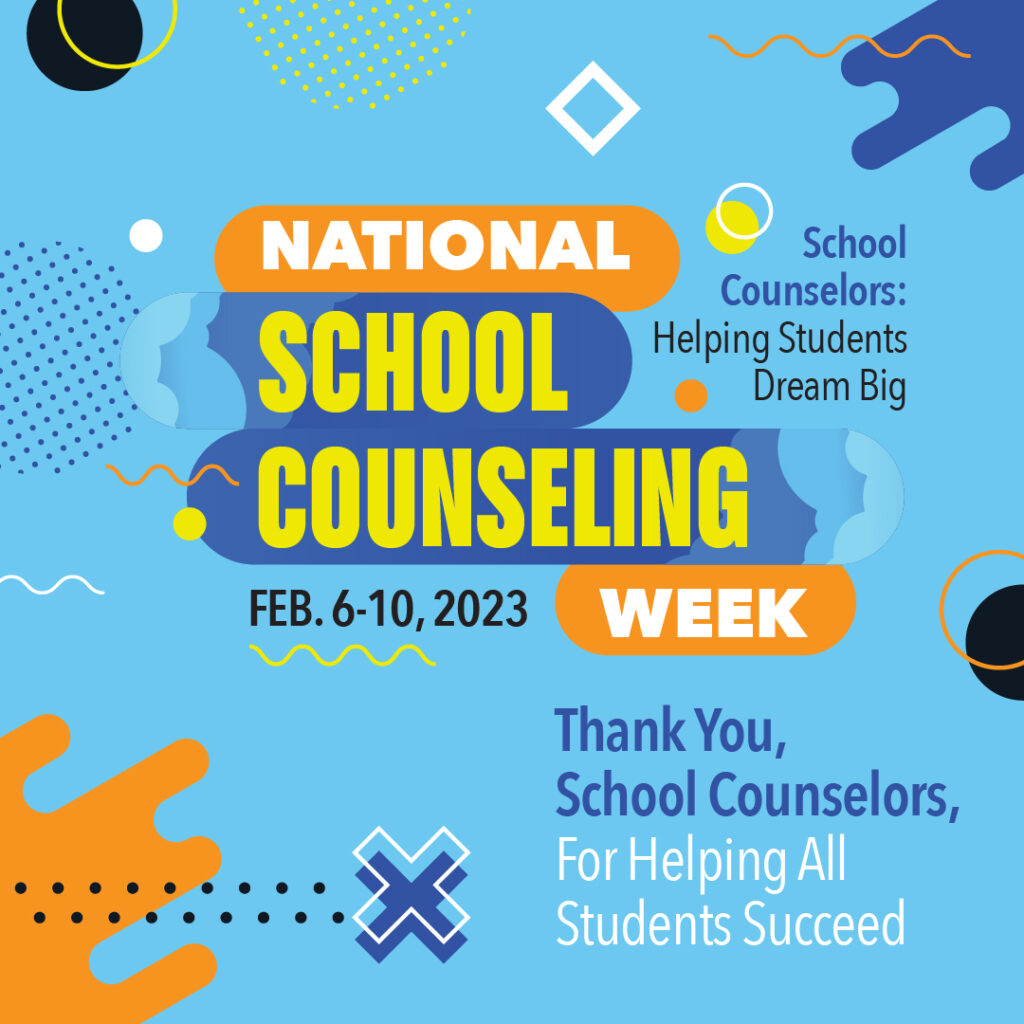Your school counselor is there for all students, but how many of your kids know the school counselor and/or know about the student support services they are there to provide? School counseling can look different across schools and grade levels, and it can be difficult to know what services are available to you and your child. National School Counseling Week is February 6–10, 2023, and this year’s theme is “Helping Students Dream Big.” In recognition of National School Counseling week, we have resources to help! In general, each counseling program consists of four components: Responsive Services, System Support, Guidance Curriculum, and Individual Planning.
Elementary School Counseling
School Counseling at the elementary level primarily consists of classroom guidance lessons. These lessons center on three different domains, social/emotional (friendships, bullying, tattling, healthy coping), educational (goal setting, time management, perseverance), and occupational (getting to know yourself and your strengths, future career goals). The school counselor is also available for individual and small group counseling, as well as referrals to community resources. If your school offers accommodations or modifications for learning differences, your school counselor may also be a resource in accessing these services. In some elementary schools, the counselor is also responsible for school and/or state testing.
Middle School Counseling
School counseling at the middle school level shifts from consisting of primarily classroom guidance to more of a balance between classroom guidance, system support, and individual academic planning (scheduling). Similar to the elementary level, the school counselor is also available for individual and small group counseling, as well as referrals to community resources. If your school offers accommodations or modifications for learning differences, your school counselor may also be a resource in accessing these services. In some schools the school counselor is also responsible for school and/or state testing.
High School Counseling
School counseling at the high school level consists of a similar breakdown to the middle school level with a balance of classroom guidance, system support, and individual academic planning. However, there is also a huge focus on college and career planning and readiness (this includes personal graduation plans, recommendation letters, and/or sending transcripts). The school counselor is also typically responsible for coordinating SAT/ACT testing, state testing, AP courses and testing, and Dual Credit courses. As with both elementary and middle school counseling, the school counselor is also available for individual and small group counseling, as well as referrals to community resources. If your school offers accommodations or modifications for learning differences, your school counselor may also be a resource in accessing these services.
It is important to note that counseling services on your child’s campus may differ depending on the school counselor’s education, training, and certification. To understand the school counselor’s specific role on your child’s campus, look for counseling information on the school website and/or contact the school counselor directly through the faculty directory. School counseling services are available to all students, and are aimed to help the development of the whole child, not just academically, but socially, emotionally, and relationally.

When to Seek Counseling
There are many reasons counseling can be beneficial for children. The list below provides things to look for in your child that may signal a benefit to counseling services. This list is not all encompassing, however can be helpful in identifying potential struggles your child may be going through. If you are noticing your child is experiencing multiple symptoms on the list, please reach out to your school counselor or seek outside counseling support. The best way to identify children who need counseling is with your gut feeling. Parents are wonderful at knowing and sensing when their child needs additional help or support.
Emotional Struggles
- Excessive crying
- Consistent over reaction to situations
- Overly needy for attention
- Unable to control temper
- Separation difficulty
- Poor impulse control
Social Struggles
- Excessive arguing with friends
- Bullying or target of bullying
- Excessive time spent alone
- Excessive lying or purposely hiding information
Behavioral Struggles
- Hitting/kicking
- Screaming
- Inability to follow directions
- Inability to follow rules
- Difficulty in managing impulses
Situational Struggles
- Divorce
- Separation
- Death of family member
- New sibling
- Deployment of parent
- Change in living arrangements
Medical Struggles (difficulty coping with)
- Seizures
- Major illnesses
- Asthma
- Type 1 diabetes
- Tourette’s
- Self or family members struggling with COVID-related illness
Academic Struggles
- Increased need for one-on-one assistance
- Memory and retention issues
- Test anxiety
- Staying on task
- Forgetting to complete assignments
About the Authors
Emily Daniels is a Licensed Marriage and Family Therapist. She has worked in Archdiocesan schools for five years across all grade levels. Additionally, she has worked in a private practice setting, at The Institute for Couple and Family Enhancement, for four years. Emily specializes in working with children and families ages 3+.
Lindsay Durham is a Licensed Marriage and Family Therapist. She worked in Archdiocesan schools for five years across all grade levels. She currently works in a private practice setting, at The Institute for Couple and Family Enhancement. Lindsay specializes in working with children, teens, and families struggling with a variety of issues.
Read More About Mental Health
- “Tips for Young Learners from Stellar Students,” Raya Belton, San Antonio Charter Moms, January 20, 2021
- “Making Memes and Building Character,” Amanda Maloney, San Antonio Charter Moms, November 20, 2020
- “Mindful Parenting: Practicing Peacefulness in Your Home,” Deborah Haddock, San Antonio Charter Moms, September 2, 2020
- “What Happened to Sleep Schedules?”, Emily Daniels and Lindsay Durham, San Antonio Charter Moms, July 27, 2020
- “Mindfulness Moments with Yoga for Classrooms,” Paula Turner, San Antonio Charter Moms, July 20, 2020
- “Making Faces and Building Social and Emotional Skills,” Jennifer St. Pierre and Elizabeth Scott, San Antonio Charter Moms, July 15, 2020
- “Friend Tree: Draw Strength From Your Community,” Jeff Flores and Khalid Zakaria, San Antonio Charter Moms, July 14, 2020
- “Grumpy Pants: Art and Emotional Wellness,” Jessica G. Rivera, San Antonio Charter Moms, July 10, 2020
- “The New Digital Parenting: Connections Over Conflict,” Emily Daniels and Lindsay Durham, San Antonio Charter Moms, July 9, 2020
- “Embracing Emotional Learning During a Pandemic,” Kristen Henry, San Antonio Charter Moms, June 14, 2020
- “No, Really, How Do You Feel? Helping Children and Teens Understand and Regulate Their Emotions,” Kristen Henry, San Antonio Charter Moms, June 3, 2020

